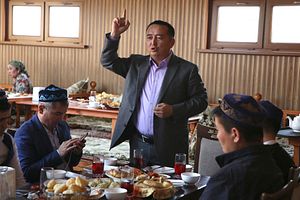The systemic oppression of over a million Uyghurs, ethnic Kazakhs, and other Muslim minorities is one of the starkest examples of China’s appalling human rights record. But it is not just the Chinese government that is willing to go to extreme lengths to stifle criticism of what is happening in the Xinjiang Uyghur Autonomous Region. While much of the accountability undoubtedly lies with China, the willful compliance of their neighbor to the northwest, Kazakhstan, is a contributing factor in the ongoing abuse in the region. And Kazakhstan, which depends heavily on China for financial assistance, recently detained one of the strongest advocates for the human rights of the people of Xinjiang, with little concern shown from countries like the United States that claim to be concerned about the region.
Serikzhan Bilash is one of the most prominent of a group of activists working to draw attention to the plight of ethnic Kazakhs and others in the Xinjiang region. As the leader of the Kazakh human rights organization Atajurt, he has long provided vital information on human rights in China, a country where state security keeps a tight lid on information, and his work has been invaluable to Amnesty International and other human rights organizations. He was arbitrarily detained in March and charged under an article in the Kazakhstan Criminal Code that has been used against other human rights defenders in the country to quell dissent. With his detention, one of the few sources of information on China’s “re-education camps” in Xinjiang has gone dark.
Considering the Trump administration’s rhetoric on the camps and the fact that the State Department has designated the fate of Chinese Muslims as a priority, it would be reasonable to think that the U.S. government would have something to say about Serikzhan’s arrest and Kazakhstan’s role in allowing human rights violations to continue. Vice President Mike Pence has been quoted as recently as October citing survivors who feel that the camps are “a deliberate attempt by Beijing to strangle Uyghur culture and stamp out the Muslim faith.” Yet the White House could not bring itself to condemn the arrest.
It’s not as though the administration has ignored Kazakhstan altogether, at least not when it comes to economic partnerships. Senior State Department officials have urged Kazakhstani counterparts to broaden regional cooperation and enhance bilateral trade. In January 2018, Kazakhstan’s then-President Nursultan Nazarbayev met with President Donald Trump in Washington. The State Department responded by issuing a fact sheet highlighting the two nations’ joint efforts on everything from pharmaceuticals to railways.
But when the White House turns its attention to human rights in Kazakhstan, it’s rarely for the better. Following Nazarbayev’s resignation in March after 29 years in office, the State Department released a pollyannaish press statement heralding Kazakhstan’s “respect for fundamental freedoms.” Some high-ranking U.S. officials seem to believe that speaking out on human rights in Kazakhstan doesn’t yield results. They wouldn’t know because they’ve never tried.
Meanwhile, Muslim minorities, including ethnic Kazakhs and Uyghurs, continue to be relentlessly surveilled, harassed, and detained in the so-called “transformation-through-education centers,” where they are subjected to political indoctrination and torture, while the Chinese government claims to be providing “vocational training.” Travel abroad, contact with foreigners, religious observance, or even physical appearance alone can be cause for detention.
With a small band of volunteers and a video recorder, Serikzhan Bilash was one of the few individuals giving the world a glimpse of their horror by giving them a space to tell their stories. When Amnesty International staff arrived in Kazakhstan, his organization Atajurt invited affected family members to come and talk about their experiences. Our researchers were quickly overwhelmed by the response. Around a hundred people lined up outside the office, and Serikzhan’s work was critical in getting these stories heard.
Now he sits under house arrest while the White House has remained silent about both his detention and the larger crackdown on dissidents in Kazakhstan. Since his detention, others have been arrested, including two people unfurling a banner demanding free elections, and another man for simply holding a placard. His poster was entirely blank, but traffic police harried him into a van regardless.
If the Trump administration merely wishes to score points against China, it should do so without invoking human rights. If it wishes to demonstrate genuine concern for those imprisoned, it should speak out for Serikzhan. What it cannot do, however, is have it both ways. There can be no demanding justice for those interned while refusing to defend people like Serikzhan who attempt to provide it.
Daniel Balson is Advocacy Director for Europe and Central Asia at Amnesty International USA. His work has appeared in the Wall Street Journal, the New York Times, The Hill, and other publications.

































